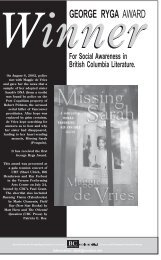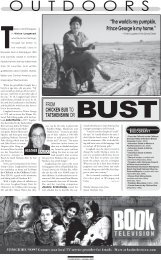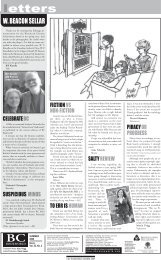Autumn 2011 Volume 25 - No 3 - BC BookWorld
Autumn 2011 Volume 25 - No 3 - BC BookWorld
Autumn 2011 Volume 25 - No 3 - BC BookWorld
Create successful ePaper yourself
Turn your PDF publications into a flip-book with our unique Google optimized e-Paper software.
13 <strong>BC</strong> BOOKWORLD AUTUMN <strong>2011</strong><br />
featureview<br />
BY JOHN MOORE<br />
Policing the Fringe: The Curious Life of<br />
a Small-Town Mountie (Harbour $24.95)<br />
Tragedy on Jackass Mountain:<br />
More Stories from a Small-Town Mountie<br />
(Harbour $24.95).<br />
Both by Charles Scheideman<br />
NUMEROUS LITERARY AND<br />
television accounts<br />
have been devoted to<br />
the glitz and squalor of urban<br />
police work. In Canada, television<br />
programs like Corner Gas and<br />
the old Beachcombers series have<br />
also tended to treat small-detachment<br />
Mounties as figures of<br />
fun, bumbling Dudley Do-rights.<br />
Forget that.<br />
Charles Scheideman’s two<br />
volumes of memoirs, Policing the<br />
Fringe and Tragedy on Jackass<br />
Mountain, provide an uncompromising<br />
look into the lesserknown<br />
world of small town law<br />
enforcement. In Scheideman’s<br />
series of tales, crime-lab-less officers<br />
often find themselves responsible<br />
for not only a town,<br />
but its rural hinterland and a<br />
stretch of major highway as well.<br />
We’re not going to Dog<br />
River here.<br />
✫<br />
COP SHOP TALK<br />
WITHOUT FEAR, FAVOUR or AFFECTION<br />
Officers of Charles Scheideman’s generation will never get credit for<br />
all the people they saved from tragic fates brought on by stupidity.<br />
THE HARDEST YEARS FOR CHARLES<br />
Scheideman, a straight-arrow<br />
farm boy from Stony Plain, Alberta,<br />
were those when he tried<br />
to be true to his RCMP training<br />
while serving under lazy or corrupt<br />
‘senior’ officers inherited<br />
from the old <strong>BC</strong> Provincial Police<br />
service.<br />
“During my police experience,<br />
I found that the smaller<br />
and more isolated a community<br />
was, the more colourful were the<br />
local characters,” he notes. His<br />
stories abound with the kind of<br />
marginal characters who might<br />
fade into the wallpaper in an<br />
urban setting, but in a small<br />
community, they have the<br />
stature of titans,<br />
for good or ill.<br />
For 27 years,<br />
Charles Scheideman<br />
(seen here circa 1960s)<br />
served in the small communities<br />
of the Interior of B.C.<br />
His rookie years as a cop<br />
coincided with the RCMP’s<br />
takeover of law enforcement<br />
from the sometimes corrupt<br />
B.C. Provincial Police.<br />
Scheideman served in<br />
Williams Lake, where the local<br />
vagabond drinking fraternity was<br />
known as the Troopers. A friend<br />
of mine served in a similar unit<br />
called the Iron Creek Cavalry in<br />
another Interior town. <strong>No</strong> one<br />
has satisfactorily explained the<br />
cavalry nicknames these groups<br />
of wandering drunks adopt, but<br />
it may be simply a mocking reference<br />
to the Mounties, a.k.a.<br />
the Horsemen, who are the opposition<br />
to be outwitted. Familiarity<br />
with the cast of characters<br />
in a small town beat has advantages—when<br />
a case of<br />
whisky mysteriously<br />
disappears from<br />
the back of a truck,<br />
you know<br />
where to<br />
look for the<br />
Troopers, the empties…<br />
and sometimes<br />
the bodies.<br />
One of the funniest<br />
stories is recounted in<br />
“Clinton 1, Bikers 0,”<br />
an event I recall from<br />
the newspapers in<br />
1968 when a bunch<br />
of Hell’s Angels<br />
wannabes calling<br />
themselves Satan’s Angels<br />
tried to imitate<br />
the movie The Wild<br />
One by taking over<br />
a small Interior<br />
town. Unfortunately<br />
for them,<br />
being urban<br />
scum proved<br />
to be poor<br />
preparation<br />
for<br />
NON-FICTION<br />
intimidating a cowboy town like<br />
Clinton, B.C., where a rifle rack<br />
in the pickup is a functional accessory,<br />
not a decorative one.<br />
After gang-beating a couple<br />
of cowboys in the tap-room of<br />
the old Clinton Hotel, the bikers<br />
soon found themselves surrounded<br />
by a large posse of<br />
cowboys, mostly Native and<br />
mostly heavily armed. They required<br />
an RCMP escort all the<br />
way down the Fraser Canyon.<br />
You could hear the laughter in<br />
Montreal. Satan’s Angels disbanded<br />
soon after. Surviving<br />
members are probably still pushing<br />
brooms at your local Sunday<br />
school, glad just to be alive.<br />
Scheideman’s story “The<br />
Gunpowder Cure” recounts his<br />
harrowing visit to ‘the Camp,’ a<br />
collection of abandoned company<br />
houses on the edge of town<br />
occupied by eccentric squatters,<br />
one of whom has decided to end<br />
his marginal life by shooting<br />
himself in the head with a Lee<br />
“Tip-toeing through a gruesome death scene,<br />
the young Mounties are startled by a resurrection<br />
as miraculous, and a lot messier, than<br />
that of Lazarus.” — CHARLES SCHEIDEMAN<br />
Enfield army rifle. Tip-toeing<br />
through a gruesome death<br />
scene, the young Mounties are<br />
startled by a resurrection as miraculous,<br />
and a lot messier, than<br />
that of Lazarus.<br />
After extensive reconstructive<br />
surgery, “he never attempted<br />
suicide again,”<br />
Scheideman observes dryly.<br />
“Whatever had been bothering<br />
him had apparently been shaken<br />
loose by the blast.”<br />
✫<br />
LAW ENFORCEMENT IS ARGUABLY THE<br />
most stressful job anyone can<br />
do—a routine of duty, rectitude<br />
and attention to detail, enlivened<br />
by unpredictable chances<br />
to be killed and, in countries<br />
with strong constitutional protection<br />
of individual rights, the<br />
frequent experience of watching<br />
the guilty walk smirking from<br />
the courtroom to re-offend at<br />
the first opportunity.<br />
Some police officers fall into<br />
the bottle or vent the stress in<br />
ways that make for disgraceful<br />
headlines.<br />
A few, like Charles<br />
Scheideman, write it all down<br />
in an attempt to set the record<br />
straight. For Scheideman,<br />
integrity is absolutely<br />
essential<br />
for any<br />
officer tasked<br />
with enforcing the<br />
law in any circumstance, not only<br />
in far-flung rural areas. The<br />
RCMP book says the law is to be<br />
enforced “without fear, favour or<br />
affection” and Scheideman recounts<br />
abundant incidents in<br />
which combinations of all three<br />
weigh heavily on the judgment<br />
and interpersonal skills of the officer<br />
who answers the call.<br />
Sometimes, the rule of law<br />
has to get bent in the interests<br />
of justice; when a woman is being<br />
beaten by her husband and<br />
a couple of her male relatives lay<br />
such a monumental shit-kicking<br />
on the guy that he becomes a<br />
model husband, you can forgive<br />
the local Mounties for borrowing<br />
the blindfold of justice for<br />
the evening. Discretion is the<br />
better part of policing.<br />
Despite his distaste for lawyers<br />
adept at twisting the law to<br />
free the guilty and some opinions<br />
that will inflame the ’roids<br />
of the politically correct,<br />
Scheideman is also highly critical<br />
of the new breed of RCMP<br />
officers who subscribe to the<br />
doctrine of overwhelming force.<br />
He points out that the Taserdeath<br />
of a Polish man at Vancouver<br />
Airport a few years ago could<br />
probably have been avoided if<br />
the call had been answered not<br />
by four Mounties, but by one—<br />
who would have had to use interpersonal<br />
de-escalation skills<br />
second nature to any small town<br />
officer, instead of relying on<br />
force to resolve the situation.<br />
Many of the stories in Policing<br />
the Fringe are necessarily anecdotal,<br />
especially the stories<br />
Scheideman recounts of misadventure<br />
on the highways due to<br />
driving unfamiliar roads, lack of<br />
sleep and over-supply of alcohol.<br />
Police officers usually only see<br />
people at their worst, when impaired<br />
judgment and bad luck<br />
put them in harm’s way. But they<br />
also see the worst people at their<br />
worst—frequently—and knowing<br />
the family history of some of<br />
those whose sad short lives he<br />
memorializes conveys a sense of<br />
how impossible it is to protect<br />
certain people from their fates,<br />
and how emotionally difficult it<br />
is to watch them go down without<br />
being able to save them.<br />
What RCMP officers of<br />
Scheideman’s generation will<br />
never get credit for is the<br />
number of people they probably<br />
did save from tragic fates<br />
brought on by stupidity.<br />
Back in Scheideman’s rookie<br />
years, when I was in my teens, I<br />
mouthed off at a six-foot constable<br />
who just laughed as he<br />
tapped me lightly behind the<br />
ear with a flashlight packed with<br />
four D-cell batteries. When I<br />
woke up, he informed me in the<br />
friendliest way that if I continued<br />
to lie down in the street,<br />
he’d have to arrest me for vagrancy.<br />
I never mistook a police<br />
officer for a legitimate target of<br />
my existential angst again.<br />
They’re just ordinary human<br />
beings doing a very extraordinary<br />
job. Policing: 978-1550174823;<br />
Tragedy: 978-1550175509<br />
<strong>No</strong>velist and critic John Moore keeps<br />
the peace in Garibaldi Highlands.
















